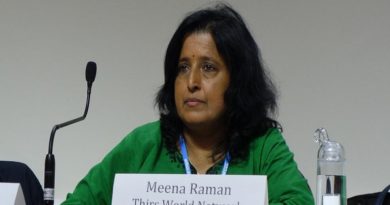Implement Minamata Convention on Mercury, tribes tell US
Tribal Leaders that participated in the Annual Conference of the National Congress of American Indians (NCAI) held on 20th October, 2017 have adopted a resolution calling for United States (US) government to uphold its international obligations under the United Nation Minamata Convention on Mercury by reducing mercury contamination impacting the health and environment of Tribal Nations. The resolution was submitted by Pit River Tribe of California and was strongly supported by the International Indian Treaty Council (IITC).
The resolution specifically encourages the United States to implement the newly established Minamata Convention on Mercury, a global internationally-binding treaty calling on State Parties including the US to protect human health and the environment from the harmful effects of mercury. Mercury is linked to serious health problems, including heart disease and neurological problems in infants and children. Mercury enters the environment and human body through contamination emissions from coal-fired power plants, mercury-based dental fillings and gold mining including abandoned waste sites.
Exposure to mercury continues to be a matter of urgency for American Indian and Alaskan Native Tribal Nations because it severely impacts their subsistence rights and traditional diets, in particular through consumption of contaminated fish by women of childbearing age and pregnant women. The most serious impacts are on the developing nervous systems of unborn and nursing babies and young children.
The Minamata Convention, which the US signed on to in 2013, provides guidance on the identification and remediation of contaminated sites, calls for a ban on new mercury mines and the phase-out of existing ones. It commits States to phase out and phase down mercury use in a number of products and medical/dental procedures, control emissions into air, land and water, and regulate small-scale gold mining. The Convention also addresses interim storage of mercury and its disposal once it becomes waste such as medical and e-waste.
In the resolution, NCAI and its members “request the United States take meaningful steps to ensure the full and effective implementation of the Minamata Convention on Mercury and take meaningful steps towards implementing it, in accordance with its Federal Trust and Treaty Responsibilities to Tribal Nations”; and “encourage Tribes to assess sources of mercury contamination on their lands and will work to reduce exposure to their Tribal communities and commit to work actively with local, state and federal governments to identify and remedy mercury contaminated sites”.
Tribal Nations in California, Alaska, Nevada and South Dakota and other regions where gold mining was carried out extensively prior to 1950 are particularly impacted by ongoing exposure due to abandoned gold and mercury mine sites which were never adequately cleaned up. Mickey Gemmill, Chairman of Pit River Tribe in Northern California, advocated for the adoption of the resolution at NCAI, stating “the ongoing impacts of mercury have affected our people and our lands since the time of the Gold Rush, and it’s time to hold the government accountable for their attacks on our lands and people.”
Rochelle Diver, an IITC delegate attending the NCAI Annual Conference, commended the adoption of the resolution [MKE‐17‐022]. She stated that “it’s important that Tribes work together to utilize UN Conventions that can assist in the protection of our lands, territories, health and livelihoods as well as our children and unborn generations. This is an area where greater participation by Tribes could make a significant impact in ensuring that the US is held accountable to its Treaty, Trust and Human Rights obligations to Indigenous Nations”.




